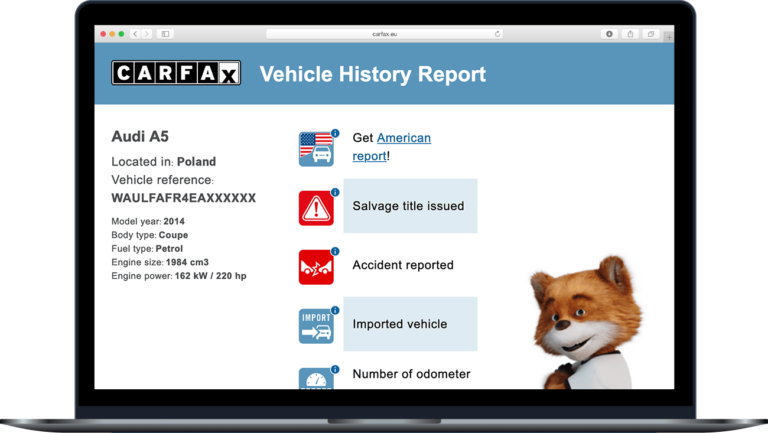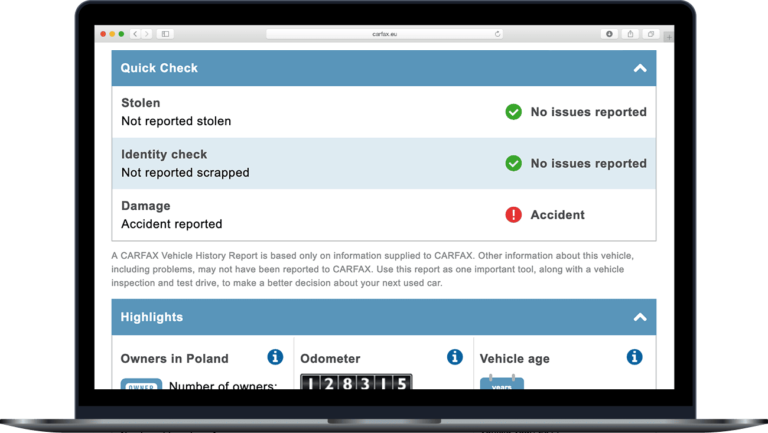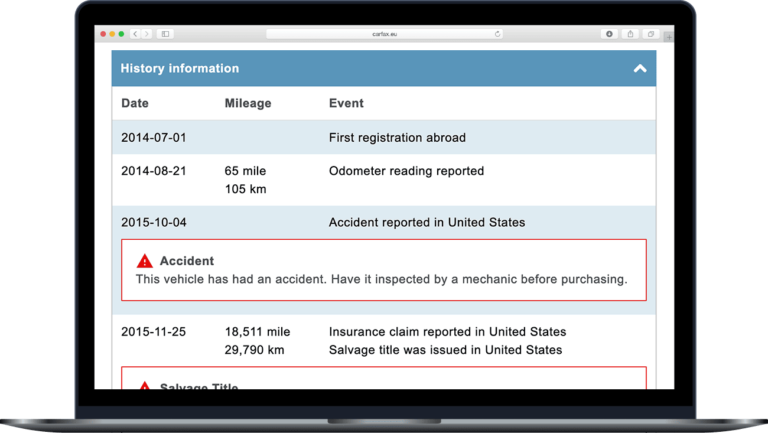Find out about the car’s maintenance history before you buy.

One often hears that you should never buy a used car without having its service history. But just how important is the service history of a car? Should shoppers automatically walk away from the purchase of a car, simply because the service records are incomplete or missing altogether? What are the possible consequences of buying a vehicle which hasn’t undergone the proper maintenance services? Here at CARFAX, we take a look at these questions and explain the importance of the service history of a car, as well as where you can find the complete history of service records.
The service history of a car consists of any maintenance work done on a vehicle, regardless of the frequency, difficulty, or cost:
Oil change is perhaps the most common maintenance performed on a vehicle is to regularly change the oil.
Cabin and air filter replacement
Windshield wipers replacement
Battery replacement
These common forms of vehicle maintenance are all typically quick and easy ways to maintain a vehicle. Other maintenance services that can put a strain on your wallet include:
Changing spark plugs. If the spark plugs are covered in a buildup or simply worn out, the engine will not operate efficiently. This means extra fuel costs and can lead to a breakdown in the future.
Wheel balance and rotation. It’s also important to ensure the tires are balanced and rotated. Having the car properly aligned also prevents the need to replace all four tires at once (which can be very expensive) due to uneven wear.
But there are some records in the service history of a car which are more critical to look out for:
Timing belt replacement. Many vehicles require that the timing belt be changed every 100,000-120,000 kilometers. This service can be an expensive and failing to perform it can result in the belt snapping. When a timing or serpentine belt fails, your car will break down wherever it is, and there is a risk that other significant parts will be damaged due to the failure. A snapped timing belt can also lead to an engine replacement being necessary, which increases the costs of repair significantly.
Without having the service history of a car, it’s very difficult to know if and when this maintenance has been performed.
One of the greatest benefits of buying a vehicle which includes with the service history, is the peace of mind it brings with it. Owners who took the time, and spent the money, to regularly maintain their vehicle often tend to have taken better care of the vehicle in general.
If the previous owner kept all the service and maintenance receipts, one could assume they drove the car with pride and wanted to ensure it was in the best technical condition possible.
This is usually seen as a plus for used car shoppers, as it is preferable to buy a vehicle which was driven with love, rather than abuse. While a stack of service records doesn’t automatically mean the vehicle is in perfect condition, it is still a good sign.
If the owner of the vehicle you’re interested in doesn’t have the records available, this doesn’t necessarily equal a red flag for the vehicle. Some owners perform the regular maintenance but aren’t the type to keep records. Or sometimes the owner simply lost them.
It may be possible, however, that the vehicle simply wasn’t properly serviced. These vehicles carry a much higher risk. Buyers should be aware that problems can, and often do, arise when a vehicle has no service history. Accidents can occur due to an unforeseen mechanical failure. Hefty repair bills can come suddenly and without warning. For these reasons and more, it’s very important to find out if the vehicle has been properly maintained.
If you are a used car seller, and you have lost – or never had – the service history of your car, showing the CARFAX Report to potential buyers demonstrates that you have nothing to hide about your car. This builds trust in a situation where the customer could potentially walk away from the sale.



If the vehicle was serviced by an official manufacturer or franchised dealership, records are maintained in their computer system. It is often easy enough to obtain them from the dealership directly.
There is another, easier way to find out the service history of a car. The CARFAX Vehicle History Report contains all reported service and maintenance records over the course of a vehicle’s lifetime.
In addition to the service history, CARFAX’s Vehicle History Report offers used car buyers a lot more useful information, including:
Registration information
Technical specifications
Vehicle age
Number of owners
Mileage records
Odometer manipulation
Title history
And much more…
Our ever-growing database has over 14 billion records from sources around the globe. Learning about the service history of a car and much more can help you avoid buying a vehicle with costly hidden problems. Check the CARFAX before you buy!




Ask directly for the VIN or, even better, directly for the CARFAX Vehicle History Report. You could also make a note of the VIN when inspecting the car.
You can find the VIN in the vehicle documents and also in several places inside the vehicle.

When you visit any website, it may store or retrieve information on your browser, mostly in the form of cookies. This information might be about you, your preferences or your device and is mostly used to make the site work as you expect it to. The information does not usually directly identify you, but it can give you a more personalized web experience. Because we respect your right to privacy, you can choose not to allow some types of cookies. Click on the different category headings to find out more and change our default settings. However, blocking some types of cookies may impact your experience of the site and the services we are able to offer.
These cookies are necessary for the website to function and cannot be switched off in our systems. They are usually only set in response to actions made by you which amount to a request for services, such as setting your privacy preferences, logging in or filling in forms. You can set your browser to block or alert you about these cookies, but some parts of the site will not then work.
These cookies allow us to count visits and traffic sources so we can measure and improve the performance of our site. They help us to know which pages are the most and least popular and see how visitors move around the site. All information these cookies collect is aggregated and therefore anonymous. If you do not allow these cookies we will not know when you have visited our site, and will not be able to monitor its performance.
These cookies enable the website to provide enhanced functionality and personalization. They may be set by us or by third party providers whose services we have added to our pages. If you do not allow these cookies then some or all of these services may not function properly.
These cookies may be set through our site by our advertising partners. They may be used by those companies to build a profile of your interests and show you relevant advertisements on other sites. Targeting cookies uniquely identify your browser and internet device. If you do not allow these cookies, you will experience less targeted advertising.